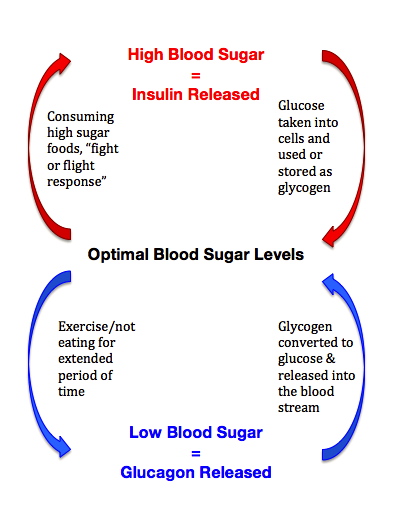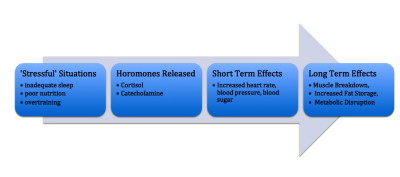
December 9, 2013 The Athletic Build
(Last Updated On: November 18, 2021)
"'Crossfit is distinctive, if not unique, in its focus on maximizing neuroendocrine response…'
– Greg Glassman
I took my Crossfit Level 1 in the fall of 2012 and while I definitely enjoyed it (met awesome people, learned some pretty cool stuff) I also distinctly remember feeling annoyed at how much the term "Neuroendocrine Response" was thrown about but never satisfactorily explained.
'Olympic weightlifting and functional movements like the squat and deadlift are more effective than isolation exercises because they elicit a greater neuroendocrine response'
..but we didn’t get much of an explanation of what was actually going on other than that it was
'something to do with building muscle and strength because we release more hormones '

To be fair it was only a 2-day course, there was a lot of content to cover and its understandable that the course didn’t go into full nerd-level with detail. And if you look at "Foundations" in the journal it does go slightly more in-depth
'neuroendocrine adaptation' is a change in the body that affects you either neurologically or hormonally
'substantial increases in testosterone, insulin-like growth factor & human growth hormone…[are vital to athletic development]'
'Heavy load weight training, short rest between sets, high heart rates, high-intensity training, and short rest intervals, though not entirely distinct components, are all associated with a high neuroendocrine response.'
But that still doesn’t really explain how or why it works. Now, I understand that for a lot of people knowing it will create results is enough, they don’t want to know how and why it works and that’s ok. However, as a coach and trainer, I think it is our responsibility to actually understand the hows and the whys and if anyone wants to "promote" Crossfit as a better type of exercise based on the fact that
'functional movements such as squats and deadlifts elicit a greater neuroendocrine response and create better results'
they had better be prepared to explain what this means.
Hormones 101
As Glassman stated in Foundations, the term "neuroendocrine response" (adaptions) refers to the interaction between our nervous (neuro-) & hormonal (-endocrine) systems, in particular with regards to exercise. Hormones are chemical substances that act like messenger molecules in the body. Now there are A LOT of hormones in the human body, but some of the more crucial ones, when it comes to muscular development and increased strength are
- Testosterone
- Human growth hormone (GH)
- Insulin-like growth factor (IGHF-1)
- Insulin & Glucagon
- Cortisol & catecholamines (e.g. norepinephrine, epinephrine)
So let’s take a (semi) quick look at each of the "key hormones"
Testosterone
Testosterone is produced in the sex organs and is often referred to as "the male hormone" because of the development (and maintenance) of several male sex characteristics; but it actually has an important role in both the male and female body. The level of testosterone produced by our bodies is affected by how much we
- exercise,
- eat/sleep and
- "get stressed out"
and the more testosterone our bodies produce the more our bodies will build and maintain muscle and hold onto fat stores less.

Human Growth Hormone (GH) & Insulin-Like Human Growth Factor (IGHF-1)
Produced and secreted by the adrenal glands GH’s primary function is to promote growth of structures within the body (well duh…). Among other things GH regulates protein creation, fat breakdown & muscle-building; all of which is mediated/assisted by IGHF-1 (sort of like a mediator)
GH is also associated with appetite control via the production of pancreatic hormones that regulate blood sugar (glucose) levels, and similar to testosterone, "optimal" levels of GH and IGHF-1 depend on whether we have proper
- exercising
- sleeping and
- eating habits.
Insulin & Glucagon
Insulin & Glucagon are pancreatic hormones that controls our blood sugar levels by converting glucose into glycogen for storage when levels are too high (insulin) or taking glycogen stores and turning them into glucose when levels are low (glucagon).

Insulin often gets a bad rep because "insulin resistance" is a condition associated with weight gain, damaged arteries and type II diabetes; but this only occurs when insulin levels are chronically elevated due to unhealthy habits related to food, sleep, exercise or stress (noticing a trend?). For most people – unless they have a genetic condition like type I diabetes – a healthy lifestyle is all they need to keep glucose, insulin and glucagon levels in check.
Cortisol & catecholamines (norepinephrine and epinephrine)(aka the fight or flight and stress hormones)
Norepinephrine and epinephrine (also known as adrenaline) are released under high-stress 'fight or flight' situations in order to ‘prepare the body’ (e.g. increased heart rate, blood pressure, glucose levels etc) to react. Cortisol (a catabolic hormone) is also released when we’re "stressed" and one of its key roles is to increase blood glucose levels and provide a readily available energy source should we need to 'fight' or 'run like hell'.
Unfortunately, the body can’t differentiate between the different types of stress
- emotional
- physical or
- psychological
and as a result, a large portion of the population is walking around with elevated levels of stress hormones. So not only are they constantly "feeling stressed" (not fun) but also all our hard-earned work is being undone because of cortisol
- eats away at muscle stores
- increases appetite
- slows metabolism and
- contributing to weight gain.
But wait, doesn’t exercise "stress" the body? and isn’t that supposed to be a good thing? Yes, exercise does stress the body, however, any of the negative effects of the cortisol is offset by endorphins we release during exercise."

(For the rest of this great article on: "Crossfit, Weightlifting And The Neuroendocrine Response", click on The Athletic Build link above)

